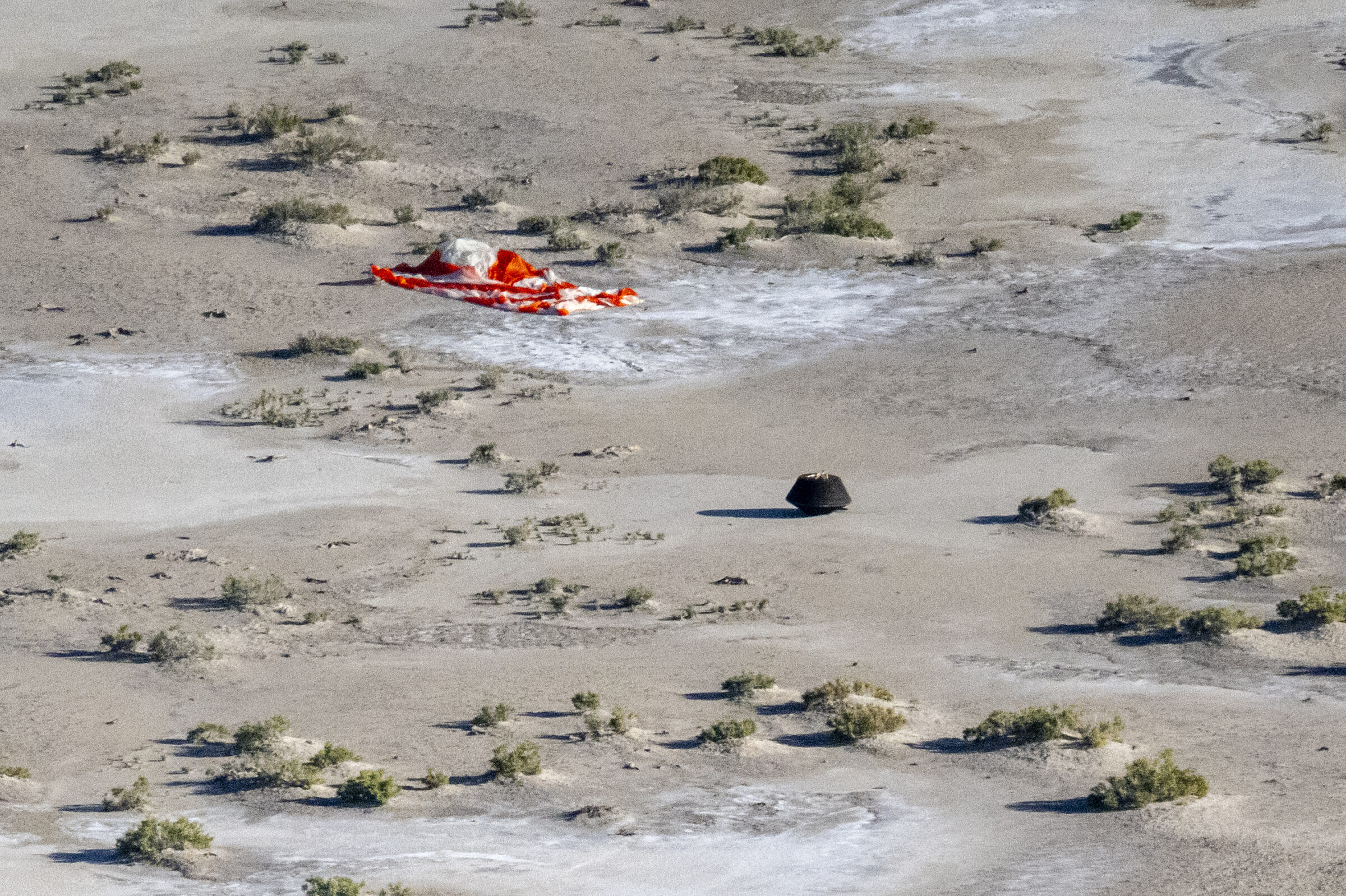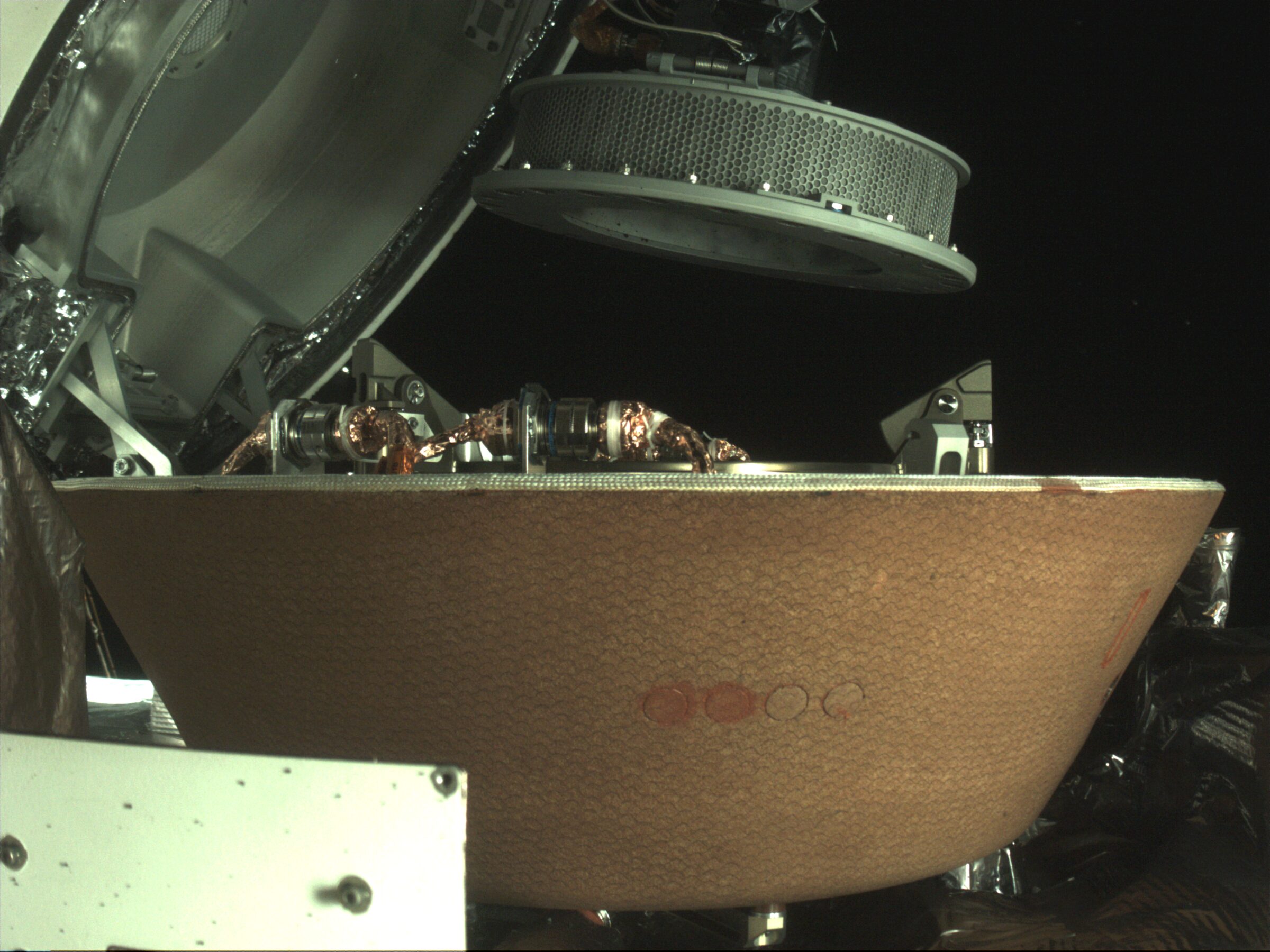Jason Davis • Sep 24, 2023
OSIRIS-REx returns sample from asteroid Bennu to Earth
NASA’s OSIRIS-REx spacecraft has delivered a sample of asteroid Bennu to Earth, completing a seven-year mission that spanned 7.1 billion kilometers (4.4 billion miles).
The sample, tucked inside a mini-fridge-sized capsule, parachuted to a landing at the Department of Defense’s Utah Test and Training Range southwest of Salt Lake City. Touchdown occurred about three minutes ahead of schedule at 10:52 a.m. EDT (14:52 UTC).

The sample capsule endured an intense plunge through Earth’s atmosphere that began at 10:42 a.m. EDT. (14:42 UTC). Reaching speeds of 43,000 kilometers per hour (27,000 miles per hour), the capsule’s exterior was expected to encounter temperatures up to 2,900 degrees Celsius (5,300 degrees Fahrenheit) — twice as hot as lava.
A drogue parachute opened to stabilize the capsule before a large main parachute unfurled shortly thereafter. A NASA TV commentator said the main parachute opened earlier than expected. The capsule then touched down on the desert floor, targeting a landing zone measuring 58-by-14 kilometers (36-by-8.5 miles).
OSIRIS-REx team members traveled via helicopters to the landing site, where they are expected to collect soil and air samples. These samples will help rule out Earthly contaminants as scientists determine the makeup of the Bennu materials.
In the coming hours, the team will lift the capsule into a metal crate, wrap it in protective Teflon and a tarp, and bundle it into a harness. A helicopter will then grab the harness and fly the capsule to a nearby temporary clean room. NASA plans to hold a post-landing news conference today around 5:00 p.m. EDT (21:00 UTC), after the capsule is safely in the clean room.

Technicians will next open up the capsule and extract the small canister containing roughly 250 grams (a half-pound) of precious Bennu samples — about enough to fill a coffee mug. The canister is scheduled to be flown to NASA’s Johnson Space Center in Houston, Texas on Sept. 25. It will be stored in a clean room at the center’s Astromaterials Research and Exploration Science division, which hosts numerous other Solar System samples.
Over the next two weeks, researchers will carefully disassemble the sample container and perform an initial analysis of the asteroid materials. NASA plans to unveil the OSIRIS-REx team’s initial findings on Oct. 11.
Bennu is an ancient near-Earth asteroid made of materials leftover from the construction of our Solar System. It is thought not to have changed significantly in the past 4.5 billion years. Asteroids like Bennu may have carried water and organics to Earth long ago. The OSIRIS-REx samples will help us understand what conditions were like in the early Solar System, before life arose on Earth.
Portions of the sample will eventually be distributed to partner organizations and agencies for further study. Additionally, some of the materials will be left untouched and stored for future generations to analyze.
OSIRIS-REx touches Bennu NASA's OSIRIS-REx spacecraft successfully collected a sample from asteroid Bennu on October 20, 2020.Video: NASA Goddard
After releasing its sample capsule, the OSIRIS-REx spacecraft fired its thrusters to avoid entering Earth’s atmosphere. It flew past our planet to begin an extended mission to asteroid Apophis, under the mission name OSIRIS-APEX (OSIRIS-Apophis Explorer).
Apophis is an S-type, “stony” asteroid that is more dense than asteroids like Bennu. Measuring roughly 450 meters (1,500 feet) wide and 170 meters (550 feet) tall, Apophis would cause widespread destruction if it were to impact our planet. Although it is not expected to hit us anytime soon, it will fly past Earth by just 30,600 kilometers (19,000 miles) on April 13, 2029. The OSIRIS-APEX mission will give us new scientific insights into S-type asteroids, and help us understand how to defend Earth from them in the future.
Let’s Go Beyond The Horizon
Every success in space exploration is the result of the community of space enthusiasts, like you, who believe it is important. You can help usher in the next great era of space exploration with your gift today.
Donate Today

 Explore Worlds
Explore Worlds Find Life
Find Life Defend Earth
Defend Earth

